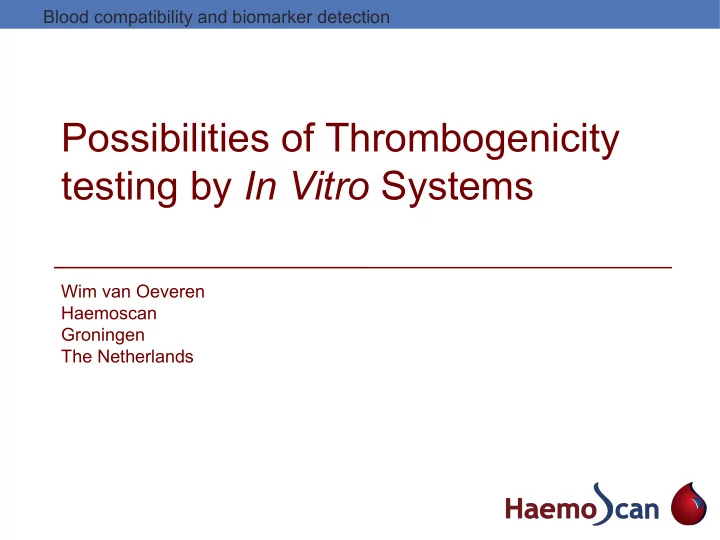

Blood compatibility and biomarker detection Possibilities of Thrombogenicity testing by In Vitro Systems Wim van Oeveren Haemoscan Groningen The Netherlands
Blood compatibility and biomarker detection Topics to be adressed • Pro's and Con's of in vitro models • General overview of various available in vitro methods • Flow loop model specifics • In vitro assay validation • Device geometry • Investigate material changes in a marketed device
Blood compatibility and biomarker detection Advantage small in vitro system • Volume from 3,5 ml • 1 Volunteer for all test and reference samples • Reproducible per donor • Puls, Flow and shear adjustable • Low costs • All immuno assays are commercially available (anti-human antibodies) • Results of a complete study in short time • Small materials for testing (from 0,09 cm2) •
Blood compatibility and biomarker detection Limitations small in vitro system • Long duration of testing not possible • Effects endothelial cells ignored • No feedback functions (from organs) • No surgical effects (incl release factors) • Anatomy differences • Aspecific blood activation (drawing, circuit) • Anticoagulant needed • Effects exagerated (ratio device/blood and accumulation)
Blood compatibility and biomarker detection Blood circulation models
Flow loop model specifics: ++ =good Chandler Pump Hemobile Making ++ ++ + Handling ++ – ++ Replicates ++ – ++ Flow/shear – ++ + Pulse – – ++ Intrinsic activation ++ _ ++
Blood compatibility and biomarker detection Hemobile specifics
Blood compatibility and biomarker detection Haemobile adjusted to heart beat frequency, Doppler flow measurement on tubing (Tubing 8mm, position 3, 15V) 0,8 0,7 0,6 flowrate (L/min) 0,5 0,4 0,3 0,2 0,1 0 -0,1 -0,2 -0,3 5 10 15 Time (sec)
Blood compatibility and biomarker detection Validation • In vitro conditions (Repeatability, reproducibility, accuracy) PDMS induced Thrombus formation: Detachment is possible ● Clinical effects
Blood compatibility and biomarker detection Validation. In vitro conditions: reproducible Platelet adhesion to PDMS (duplicates) Platelet adhesion to PVC (duplicates) 7,00 7,00 6,00 6,00 Platelets (10E9/cm2) Platelets (10E9/cm2) 5,00 5,00 4,00 4,00 3,00 3,00 2,00 2,00 1,00 1,00 0,00 0,00 1 2 3 4 5 6 7 8 1 2 3 4 5 6 7 8 donor nr donor nr Platelet adhesion to PTFE (duplicates) 7,00 6,00 5,00 platelets (10E9/cm2) 4,00 3,00 2,00 1,00 0,00 1 2 3 4 5 6 7 8 donor nr
Blood compatibility and biomarker detection Validation: reproducibility of complement and donor varia Complement C5b-9 PVC 0,70 0,60 0,50 C5b-9 (ng/ml) 0,40 0,30 0,20 0,10 0,00 1 2 3 4 5 6 donor Complement C5b-9 PTFE 0,70 0,60 0,50 C5b-9 (ng/ml) 0,40 0,30 0,20 0,10 0,00 1 2 3 4 5 6 donor
Blood compatibility and biomarker detection Validation. Clinical effects In vitro findings correspond with clinical observations Examples: Heparin coated stainless steel Carmeda coated extracorporeal circuit
Stainless steel without coating: platelet adhesion and fibrin
Coated stainless steel, almost no deposition of blood elements
In vitro results of Carmeda correspond to clinical observations Terumo Duraheart stainless steel housing of LVAD after 150 days implantation in a patient
Blood compatibility and biomarker detection Uncoated stainless steel stent after 1 hour blood contact in vitro: Thrombus formation
Blood compatibility and biomarker detection Validation. In vitro results of Carmeda correspond to clinical observations: inhibition of complement activation and leukocyte activation Complement activation in vitro (C5b-9) Complement activation in patients 1,8 3,50 1,6 3,00 1,4 2,50 1,2 C5b-9 (ug/ml) C5b-9 (ng/ml) 1 2,00 coating A uncoated 0,8 Carmeda 1,50 Carmeda 0,6 1,00 0,4 0,50 0,2 0 0,00 15"CPB 30"prot day2 1 2 3 4 5 6 7 8 9 pre end CPB day1 donor Elastase release in vitro Elastase release in patients 10,0 0,3 9,0 8,0 0,25 7,0 elastase (ug/ml) Elastase (ug/ml) 0,2 6,0 coating A 5,0 uncoated Carmeda 0,15 4,0 Carmeda 0,1 3,0 2,0 0,05 1,0 0 0,0 pre end CPB day1 day2 1 2 3 4 5 6 7 8 9 donor
Blood compatibility and biomarker detection Geometry ● Catheters, stents, vascular grafts in PVC tubing ● Heart valves: special chamber ● Other shapes: attached device
Blood compatibility and biomarker detection Geometry Heart valves can be mounted in a special device with a circular inner volume.
Blood compatibility and biomarker detection Geometry Testing of a left ventricle supporting device. Flow is generated with the Hemobile and is applied to the test chamber.
Blood compatibility and biomarker detection Haemocompatibility testing ISO 10993-4 Five categories: 1. Thrombosis 2. Coagulation 3. Platelets 4. Hematology 5. Complement
Blood compatibility and biomarker detection Choice of testing Thrombosis Inflammation SEM/ Fibrin adhesion Convertase activity SEM/Platelet adhesion/P-selectin PTT/Thrombin C5b-9, C3a, C5a Elastase count/aggregation/function generation Release products BTG, TxB2,serotonin CH50/AP50 TAT, FpA Investigate material Scanning electron microscopy changes in a Platelet adhesion, Fibrin adhesion marketed device Thromboxane B2, Thrombin-antithrombin III, C5b-9, Elastase, Hemolysis
Blood compatibility and biomarker detection Preferred direct surface examination Thrombosis: Scanning electron microscopy Coagulation: Fibrin adhesion Platelets: Platelet adhesion, P-selectin expression Inflammation: Hematology: Leukocyte binding (CD11) Complement: C5-Convertase or C3b Separate experiments (24 hrs): H emolysis
Blood compatibility and biomarker detection To be determined Circulation time 4 hours, or 1 hour, or shorter time (platelet and complement react optimally within 30 minutes.
Blood compatibility and biomarker detection Conclusion In vitro systems are excellent tools to determine the material properties. The small loop systems allow multiple testing incl references with blood from 1 (human) donor. Human blood is different from animal blood and all assays can be done on human blood samples. Differences between donors can be observed, which may lead to an estimate of number of donors needed. Thrombogenicity testing by in vitro systems creates new possibilities
Recommend
More recommend